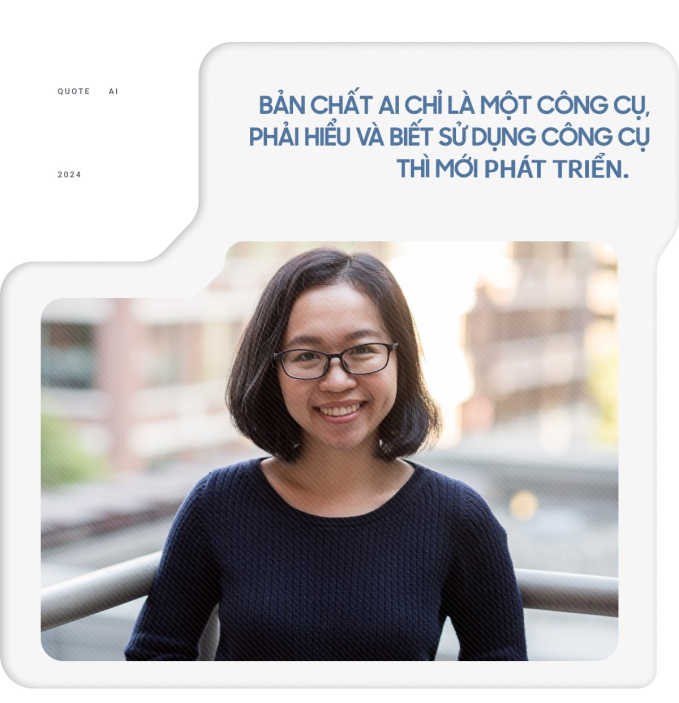In 2023, AI – artificial intelligence can be said as one of the hottest keywords. Everyone knows or starts to know about AI and understands its power to some extent, while others even feel the threat as AI becomes smarter and more comprehensive every day.
Who will win AI, who will fear AI, and who will collaborate to develop with AI, there is no exact answer. Only know that AI has, is, and will have an impact on many people, many professions. The risk of being laid off is real, but new opportunities will also arise.
When it comes to AI, many people think that it only relates to individuals or groups working in technology. But in reality, AI can become a “game-changer” in all fields, including recruitment. With over 10 years of experience working in Southeast Asia and Silicon Valley (USA); formerly served as COO of Percolata, a $10 million (series A) AI startup in Palo Alto; author of the book “Dare to Think – Dare to Dream – Dare to Rest: Perspectives on Life and Work from Mekong to Silicon Valley” (Tre Publishing House); TEDx Talk speaker: “Rethink: Education, Women’s career and Inner Transformation,” Ms. Ai Huynh has shared a lot about this topic.

Author Ai Huynh
On the 3rd day of Tet, let’s follow the conversation with Ms. Ai Huynh about the impact of AI on recruitment and business operations!
Hello, Ai – from a concept that was once unfamiliar, has now become an existence that people cannot ignore, especially in Vietnam, especially in the past year, when ChatGPT became popular worldwide, people have become more aware of the power of AI. According to you, is this AI explosion a inevitable trend? Is there a specific source that has caused this wave to rise and spread?
AI has been around for over 50 years. For a long time, AI has been used in businesses. For example, AI updates ticket prices on airline websites, AI personalizes your content newsfeed…
In the past year (2023), ChatGPT has been one of the important catalysts that have made AI more popular than many years before. Why? Because ChatGPT transitioned AI from a tool used by businesses to a tool for individuals.
Anyone can go to ChatGPT and ask a question, from summarizing an academic report to asking ChatGPT for advice on how to write a resignation email. ChatGPT allows the public to interact directly with AI, so that everyone has their own experience, their own thoughts about it. From there, everyone has a “story” to tell about AI. ChatGPT helps AI become a more common topic, easier to talk about. So it has spread (laughter).
With many years of experience working in Silicon Valley, what do you think are the most notable advancements of AI?
The most notable advancement is that technology companies are paying more serious attention to ethical and safety aspects before releasing a product to the public.
For example, YouTube has an AI layer for content moderation, and then a human layer for reviewing videos with content that can be controversial or harmful to viewers’ physical and mental health. For the sake of adolescents’ healthy development in terms of physical health and appearance, YouTube even deletes or limits access to videos related to extreme weight loss to viewers over 18 years old.
In your opinion, what are the current trends of AI and what will be the focus in the near future?
The trend of AI is to make cognitive tasks (reading, listening, seeing, analyzing, moving from point A to point B, etc.) more automatic, faster, and cheaper for individual users and businesses.
What are the biggest opportunities that AI brings to businesses today and what are the challenges of implementing AI in business operations?
The opportunity is that businesses have more choices for using AI to perform certain tasks more efficiently, cheaper, and faster than humans used to do.
The challenge is that after AI helps us perform a specific task, businesses need to face the question of how to manage and develop the business.
For example, in the past, your company had to spend a lot of effort to build a Customer Care department with many criteria: from the time when customers send messages, how long it takes to have a staff member respond, what content the staff advises, what attitude the staff shows, whether messages have spelling errors or not. Nowadays, businesses can use AI tools – when customers have issues, they can chat directly with AI chatbots. The more advanced the Chatbot, the faster and more complete the interaction with customers. But the challenge is whether customers will continue to like using your company’s products/services or not, which is another challenge that businesses have to handle.
So how will AI affect the recruitment process, from the perspective of both employers and candidates?
One of the basic principles of AI is matching relevant keywords with each other.
For example, a recruiter is looking for candidates with experience in Excel. Instead of having to read each resume with their eyes, which takes a lot of time and has the potential for missing information, now the recruiter can ask AI to scan which CVs/resumes contain one of the following phrases: “spreadsheet”, “report preparation”, “data analysis”, “Excel”, etc.
Therefore, advice for candidates is that you should not randomly send one CV/resume to 100 companies. You should customize your resume to match the truth (not lie) and align it with the job posting so that you can pass the screening round by AI. Once you pass the initial scan by AI, then your resume will move on to the human review round.

In your opinion, what do you think about the future of the labor market as AI becomes smarter and smarter? Which professions can benefit from the development of AI and which ones are at risk of being laid off? Will there be new career opportunities created thanks to the development of AI that humans can explore?
AI will replace repetitive tasks that take up people’s time.
For example, in the warehouse of an e-commerce platform, in the past, employees had to walk back and forth a lot in a super large warehouse to reach the right shelves and pick the right items for orders that needed to be shipped. Now, AI robots are programmed to locate the correct shelves, avoid obstacles, pick the right items by scanning barcodes, helping to ship items faster and at a lower cost for customers.
People will be laid off in some jobs, but they have new opportunities to be trained and move up to jobs that require higher-level thinking, such as machinery management, quality control, service innovation, customer experience.
AI also creates new professions. Just as since smartphones and smarter social media, from 2019 until now, we have had data analysts, livestreamers, tech delivery drivers, online business, more modern forms of digital marketing….
According to you, what do businesses need to do in order to effectively harness the power of AI without losing the value of humans?
The essence of AI is just a tool. We have to understand and know how to use the tool in order to achieve effective results.
Businesses need to test and evaluate the effectiveness of AI for the tasks that they want it to do, adjust regularly until they achieve the optimal benefits and costs that they desire. Those are all things that people have to do themselves, AI cannot replace them (laughter).

Thank you for these insights!















